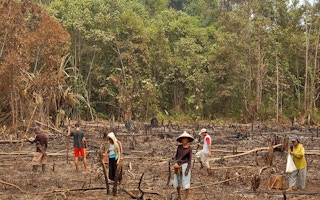The results are in, and after nearly a year of research, collaboration, and analysis, CSR Asia is publishing two reports that highlight how the Agribusiness sector can play a fundamental role in achieving long-term regional sustainability in ASEAN.
The reports are written for agribusiness companies that are, or want to be more engaged with smallholder farmers, aware of gender empowerment approaches, and seek to adopt inclusive business or/and gender transformative business models.
These reports were developed as part of the Gender Transformative and Responsible Agribusiness Investments in South East Asia (GRAISEA) Programme, which is funded by the Government of Sweden.
Led by Oxfam and involving a range of partners, including CSR Asia, the programme aims to improve livelihoods for small-scale producers in ASEAN through more responsible and inclusive value chains, private sector investments, and where women demonstrate economic leadership.
The Agribusiness and the SDGs report focuses on the role that the agribusiness sector in ASEAN can play in helping with the achievement of the United Nations Sustainable Development Goals (SDGs) from ending poverty and hunger to responding to climate change and sustaining our natural resources, food, and agriculture.
The breadth of agribusiness
The agribusiness sector is responsible for the production of food and is one of the main generators of employment and income worldwide. Agribusiness denotes the collective business activities that are performed from farm to fork.
It covers the supply of agricultural inputs, the production, and transformation of agricultural products and their distribution to final consumers. The report also includes aquaculture and agroforestry and looks at the role of different actors along the agriculture supply chain, including farmers, producers, traders, retailers, investors, and consumers.
Around the world, over 75 per cent of people living in poverty depend on agriculture for their livelihoods. The vast majority of the world’s farmers—1.5 billion people, according to the United Nations Food and Agriculture Organization (FAO)—are women and smallholder farmers (farms operating with less than two hectares of land), yet they are the largest group of people in the world living in poverty.
Smallholders provide up to 80 per cent of the food supply in Asia, and women comprise an average of 43 per cent of the agricultural labour force of developing countries, and almost 50 per cent in East and Southeast Asia.
The World Bank estimates that growth in agriculture is two to four times more powerful at reducing poverty than growth in other sectors, which presents a tremendous economic opportunity for the agribusiness sector to prioritise smallholders in their operations.
As smallholders become more productive, they are able to invest in new business opportunities, increase their purchasing power, build resilience, and save for the future.
With increasing global population growth and regional demand for food, smallholder’s economic viability and contributions to diversified landscape and culture is threatened by competitive pressure from globalization and integration into common economic areas.
Why agribusinesses should contribute to the SDGs
There is an expectation that businesses - including agribusinesses - will use their resources, capabilities, and creativity in delivering real solutions to these global challenges. The agribusiness sector has a clear stake in ensuring the achievement of the SDGs, which is emphasised by its integral role and influence in many crosscutting dimensions including:
- Enhancing livelihoods for farming communities
- Improving access to employment and decent work
- Productivity enhancement in poor earning areas
- Female empowerment
- Addressing new causes of mortality and illness (including a rise of non-communicable diseases and ill health)
- Preserving natural eco-systems
- Building resilience of the poorest to economic, natural, and social shocks
- Strengthening public private partnerships in the agribusiness sector as well as global (and regional) partnerships
- Urbanization overtaking farmland
Private business activity, investment, and innovation are seen as the major drivers of productivity, inclusive economic growth, and job creation.
In ASEAN, there is a need for businesses to adopt a more sustainable strategy for growth, not only looking for economic growth but for inclusive growth, adopting models of organisation which are environmentally sustainable and contributing solutions that help consumers and other organisations to become more sustainable.
There are numerous advantages of incorporating the SDGs into agribusiness planning across the sector. Companies that do not prioritise the SDGs, or the inclusion of smallholder farmers, women, and other marginalised groups along their supply chain, are missing a valuable opportunity to enhance their bottom line and reputation.
For each SDG we have explored the challenges and opportunities for the agribusiness sector and identified innovative organizations that are already leading by example or have incorporated various aspects of the SDGs into their operations.
“
Companies that do not prioritise the SDGs, or the inclusion of smallholder farmers, women, and other marginalised groups along their supply chain, are missing a valuable opportunity to enhance their bottom line and reputation.
A well-performing and smartly regulated agribusiness sector that can cater to rising food demands, can also help fast-track national efforts to achieve SDG1 (no poverty) and SDG2 (zero hunger). This enormous task will not be possible without joining forces and creating collaborative, multi-stakeholder partnerships. Which is the objective behind SDG17 (partnerships for the goals).
Creating partnerships between governments, the private sector, and agricultural communities will require long-term solutions ensuring that no party is left behind. It is imperative that agribusinesses be aware of the SDGs priorities of each ASEAN country in which they operate, as this will help agribusinesses choose which SDGs are relevant to their own value chain.
Committing to the SDGs creates a social contract among agribusinesses to shape the future direction of the sector and incite trust by creating decent jobs, rewarding workers fairly, paying a fair share of taxes, and investing in local communities.
Each SDG, with its own unique challenges and opportunities, is relevant and key to the continued growth and overall success of the industry. Private sector readiness to take responsibility and work with governments is required to ensure that the SDGs are achieved in the region and globally.
Companies can use this report as a tool to assess which SDGs are most relevant to their businesses and the impact they have, especially on issues such as smallholder inclusion and gender inequality, while also scoping opportunities to incorporate the SDGs into their own strategies.
Click here to read the full report.
Rebecca Walker Chan is a project manager, CSR Asia. This article is republished from the CSR Asia Insights blog.


















